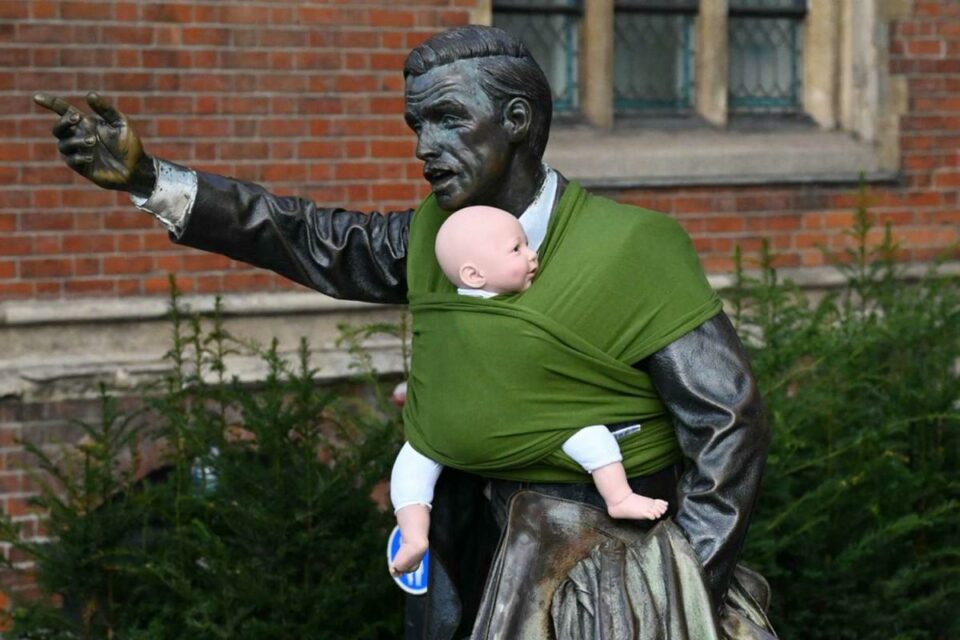And has inspired people to engage with their public spaces in new and creative ways. As the trend continues to evolve and spread, we can look forward to more imaginative and thought-provoking additions to our statues, creating a sense of connection and commonality in our communities
The Mystery of Fake Babies in Slings on Statues Unveiled in the United Kingdom
The United Kingdom is home to many beautiful and historic statues, but recently, an unusual phenomenon has been catching people’s attention. It seems that fake babies in slings are appearing on statues all over the country, leaving many people scratching their heads and wondering what it’s all about.
So, what’s the story behind these mysterious additions to the statues? Let’s delve into the mystery and unveil the truth behind the fake babies in slings on statues in the United Kingdom.
The Origins of the Trend
The trend of adding fake babies in slings to statues seems to have originated in the United States, where it began as a form of artistic and humorous expression. From there, it spread to the United Kingdom and has become increasingly popular in recent years.
Many people are intrigued by the creativity and humor behind this trend, and it has sparked a lot of discussions and social media posts. The fake babies in slings are often added to statues in a way that makes it look like the statue is holding or carrying the baby, creating a whimsical and heartwarming effect.
Notable Examples
One of the most famous examples of the fake baby in a sling trend in the UK is the statue of the 18th-century economist Adam Smith in Edinburgh. The statue, which is located on the Royal Mile, was given a fake baby in a sling, much to the delight of locals and tourists alike.
Another notable example is the bronze sculpture of Sherlock Holmes in London, which was adorned with a fake baby in a sling in a nod to the detective’s iconic abilities of deduction and observation.
The trend has also made its way to smaller towns and cities across the UK, with statues of local historical figures and famous individuals being embellished with fake babies in slings, much to the amusement of the local communities.
The Meaning Behind the Trend
While the trend of adding fake babies in slings to statues may seem lighthearted and fun, it also carries a deeper meaning. In many cases, the addition of the fake babies serves as a commentary on the statues themselves, as well as the historical figures they represent.
By adding a touch of modernity and humor to these statues, the fake babies in slings are challenging traditional notions of history and representation. They are sparking conversations about how we view and interact with historical figures and the symbols of our past.
Furthermore, the trend also serves as a form of public art and expression, allowing individuals to engage with and reinterpret the statues in a way that is both creative and thought-provoking.
The Impact on Communities
The addition of fake babies in slings to statues has had a significant impact on the communities in which they are located. It has brought people together in laughter and conversation, encouraging them to look at their local landmarks in a new and imaginative way.
Many people have taken to social media to share their photos and experiences with the adorned statues, creating a sense of community and camaraderie. The trend has also drawn attention to the statues themselves, prompting people to learn more about the historical figures they represent.
Practical Tips for Adding Fake Babies in Slings
If you’re inspired by this trend and want to add fake babies in slings to statues in your own community, there are a few practical tips to keep in mind. Here are some suggestions for ensuring that your additions are creative, respectful, and thought-provoking:
Research the statue and its historical significance before making any additions.
Use materials that are safe and non-damaging to the statue, such as fabric and non-toxic adhesives.
Consider the message or commentary you want to convey through your addition, and ensure that it is done in a respectful and tasteful manner.
Always be mindful of local laws and regulations regarding public art and modifications to statues.
Case Study: The Impact of Fake Babies in Slings on a Local Community
In the town of Bristol, a local artist added a fake baby in a sling to a statue of the 18th-century poet Thomas Chatterton. The addition sparked a wave of interest and excitement in the community, with residents and visitors gathering around the statue to take photos and share their experiences.
The addition also prompted discussions about the history of the town and the significance of the statues that adorn it. It brought people together and encouraged them to view their town in a fresh and creative light, fostering a sense of pride and connection among the residents.
A First-Hand Experience
As someone who has observed the trend of fake babies in slings on statues firsthand, I can attest to the impact it has had on the communities in which it has taken place. It has brought joy, laughter, and a renewed sense of curiosity to the streets, encouraging people to look at their surroundings with a fresh perspective.
Conclusion
The trend of adding fake babies in slings to statues in the United Kingdom has captivated the public and sparked conversations about history, art, and community. It has added a touch of whimsy and modernity to our historical landmarks,
In the United Kingdom, a movement known as the Dad Shift is striving to bring about better paternity leave options by fastening life-size baby dolls to statues using slings. This unique form of advocacy seeks to prompt government officials to expand the current requirements for parental leave. Statues of prominent figures in London and Edinburgh, such as Gene Kelly, Thierry Henry, Isambard Kingdom Brunel, Robert Fergusson, Ken Buchanan, and Wojtek the Soldier Bear have all been targeted in this grassroots campaign.
The Dad Shift aims to draw attention to the vital role that fatherhood plays in men’s lives and emphasize the need for improved paternity leave options for fathers and co-parents across the UK. The group plans to deliver an open letter to Prime Minister Keir Starmer later this month requesting his assistance in implementing better leave policies that will benefit families and contribute positively towards economic growth.
Research indicates that countries offering six or more weeks of paternity leave also experience a 4% smaller gender pay gap and a 3.7% smaller workforce participation gap. In contrast, the current statutory paternity offer for new fathers in the UK is only two weeks with minimal compensation at £184.03 (or $242.11) per week. As a result, one in three fathers do not take any leave at all when their child is born; those who do often face financial struggles due to inadequate compensation.
The Dad Shift appealed directly to Prime Minister Starmer by reminding him of his commitment towards family during his election campaign and urging him to support affordable parental leave that promotes equality among parents while allowing dads ample time with their children.
This movement highlights an essential issue affecting families today – adequate paternal leave options can have far-reaching positive effects on mothers’ well-being, infant care, father’s involvement in childcare duties as well as overall societal health outcomes.
supporting improved paternity leave is not just about acknowledging fathers’ roles but also promoting gender equality within parenting responsibilities while bolstering family dynamics across various communities.


